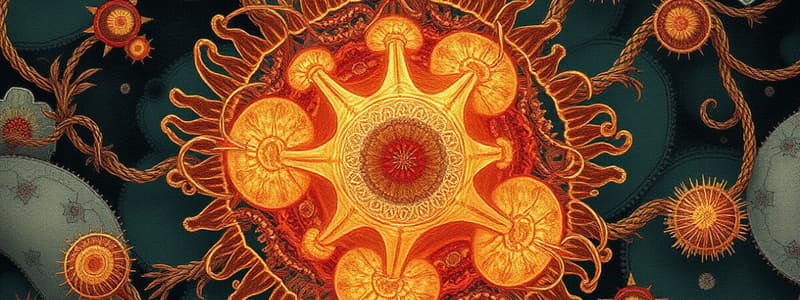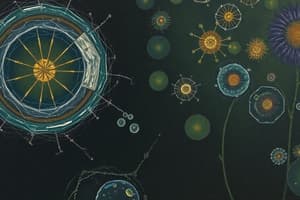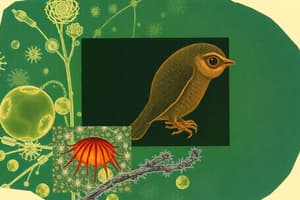Podcast
Questions and Answers
What defines a unicellular organism?
What defines a unicellular organism?
- An organism lacking cellular structure
- An organism consisting of multiple cells
- An organism that can develop into multicellular forms
- An organism made up of one cell (correct)
Which of the following statements is not part of the cell theory?
Which of the following statements is not part of the cell theory?
- All cells come from existing cells
- All organisms are made of one or more cells
- The cell is the basic unit of all organisms
- Cells can spontaneously generate from non-cellular matter (correct)
What is a key characteristic of prokaryotic cells?
What is a key characteristic of prokaryotic cells?
- Lack a true nucleus (correct)
- Can develop into multicellular organisms
- Contain DNA within a nucleus
- Possess membrane-bound organelles
Which organelle is responsible for controlling the movement of substances in and out of the cell?
Which organelle is responsible for controlling the movement of substances in and out of the cell?
What process is described as a special kind of cell diffusion?
What process is described as a special kind of cell diffusion?
What is the primary characteristic that differentiates eukaryotic cells from prokaryotic cells?
What is the primary characteristic that differentiates eukaryotic cells from prokaryotic cells?
According to cell theory, what must all cells originate from?
According to cell theory, what must all cells originate from?
Which of the following is NOT a function of the cell membrane?
Which of the following is NOT a function of the cell membrane?
What defines a multicellular organism?
What defines a multicellular organism?
What are organelles responsible for within a cell?
What are organelles responsible for within a cell?
Which statement accurately describes prokaryotic cells?
Which statement accurately describes prokaryotic cells?
Flashcards are hidden until you start studying
Study Notes
Cell Basics
- Cells are the fundamental units of life, serving as the building blocks for all organisms.
- Organisms are classified as living entities, which can be unicellular (single-celled) or multicellular (composed of multiple cells).
Cell Theory
- All living organisms consist of one or more cells.
- Cells are recognized as the basic unit of structure and function in all organisms.
- New cells are produced from existing cells, emphasizing cellular reproduction.
Prokaryotic vs. Eukaryotic Cells
- Prokaryotic cells: single-celled organisms lacking a nucleus and membrane-bound organelles; DNA resides in the cytoplasm, often utilizing flagella for movement.
- Eukaryotic cells: organisms composed of cells with a defined nucleus and membrane-bound organelles, containing DNA within the nucleus.
Animal Cell Organelles and Functions
- Cell membrane: a protective outer layer that regulates the movement of substances in and out of the cell, primarily composed of proteins and lipids.
- Controls cellular permeability through mechanisms such as diffusion and osmosis, which is a specific type of cellular diffusion for water movement.
Cell Basics
- Cells represent the fundamental unit of structure and function in living organisms.
- Organisms can be classified as unicellular (single-celled) or multicellular (composed of multiple cells).
- Organelles are specialized structures within cells, each serving a distinct function.
Cell Theory
- Every living organism consists of one or more cells.
- Cells are the fundamental units of life in all organisms.
- New cells arise only from the division of existing cells.
Prokaryotic vs. Eukaryotic Cells
- Prokaryotic cells are generally unicellular, lack a nucleus, and do not have membrane-bound organelles; they contain DNA located in the cytoplasm and often move via flagella.
- Eukaryotic cells can be either unicellular or multicellular, possess a nucleus that houses their DNA, and consist of various membrane-bound organelles.
Animal Cell Organelles and Their Functions
- The cell membrane surrounds the cell, acting as a barrier that regulates the entry and exit of substances; consists of proteins and lipids.
- Diffusion refers to the movement of molecules from high to low concentration; osmosis is a specific type of diffusion involving water across the cell membrane.
Studying That Suits You
Use AI to generate personalized quizzes and flashcards to suit your learning preferences.




